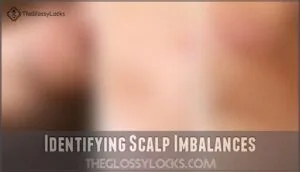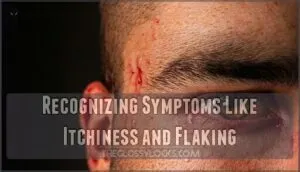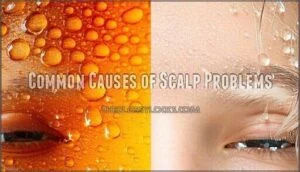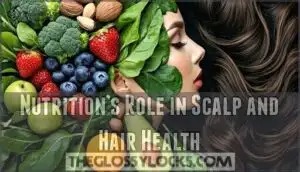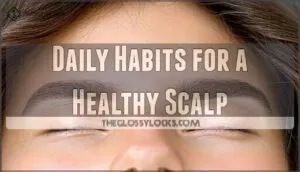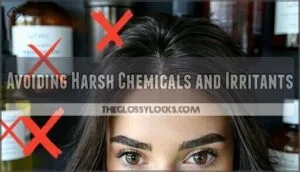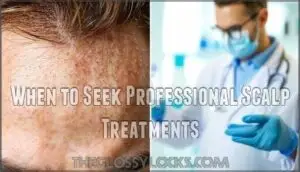This site is supported by our readers. We may earn a commission, at no cost to you, if you purchase through links.
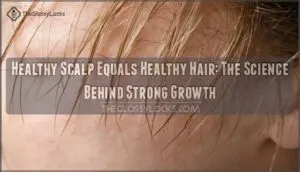
An unhealthy scalp with clogged pores, inflammation, or dryness can’t nourish follicles properly, leading to thinning, brittle strands and dullness. That’s why healthy scalp equals healthy hair – the connection is direct and undeniable.
Simple changes in cleansing, nutrition, and daily habits can transform both your scalp environment and hair quality in surprising ways.
Table Of Contents
- Key Takeaways
- Why Scalp Health Impacts Hair Growth
- Key Signs of a Healthy or Unhealthy Scalp
- Common Causes of Scalp Problems
- Nutrition’s Role in Scalp and Hair Health
- Daily Habits for a Healthy Scalp
- Choosing The Right Scalp and Hair Products
- Lifestyle Factors Affecting Scalp and Hair
- When to Seek Professional Scalp Treatments
- Frequently Asked Questions (FAQs)
- Conclusion
Key Takeaways
- You can’t achieve healthy hair without first creating a healthy scalp environment – it’s the living foundation that directly feeds your follicles through blood vessels and nutrients, making scalp health the non-negotiable starting point for strong hair growth.
- You’ll notice immediate improvements when you establish consistent daily habits like gentle cleansing 2-3 times per week, regular scalp massage for circulation, and choosing products with nourishing ingredients like tea tree oil while avoiding harsh sulfates that strip your scalp’s natural barrier.
- Your diet and lifestyle choices directly impact your scalp’s ability to produce healthy hair – you need essential vitamins (especially B vitamins and vitamin D), omega-3 fatty acids, proper hydration, stress management, and adequate sleep to maintain optimal follicle function.
- You should seek professional help when persistent scalp issues like severe itching, unusual hair loss, or treatment-resistant dandruff don’t respond to home care after several weeks – dermatologists and trichologists can identify underlying conditions and create targeted treatment plans that actually work.
Why Scalp Health Impacts Hair Growth
Your scalp isn’t just the foundation for your hair—it’s the living tissue that directly feeds and supports each follicle through its network of blood vessels and sebaceous glands.
When your scalp becomes imbalanced with issues like clogged pores, inflammation, or poor circulation, it can’t deliver the nutrients and oxygen your hair needs to grow strong and healthy.
The Scalp’s Role in Hair Follicle Nourishment
Your scalp functions like a complex ecosystem, working 24/7 to nourish hair follicles. Think of it as your hair’s personal chef and waiter combined.
Here’s how your healthy scalp nurtures hair growth:
- Follicle Blood Supply – Delivers oxygen and nutrients directly to hair roots
- Nutrient Delivery – Transports vitamins and minerals through tiny blood vessels
- Sebum Balance – Produces natural oils that protect and moisturize hair shafts
- Cellular Turnover – Removes dead skin cells while generating new ones
- Scalp Microbiome – Maintains beneficial bacteria that keep follicles healthy
When your scalp health is optimized, it creates the perfect environment for strong hair growth.
How Scalp Issues Affect Hair Quality
When your scalp health deteriorates, you’ll notice immediate changes in hair quality. Poor circulation and inflammation create a domino effect that weakens hair from root to tip.
| Scalp Issue | Hair Quality Impact | Visible Signs |
|---|---|---|
| Excess Oil | Greasy, limp texture | Hair thinning patterns, reduced volume |
| Dryness/Flaking | Breakage and split-ends | Dull appearance, manageability issues |
| Inflammation | Loss of shine and luster | Brittle strands, texture changes |
Healthy hair starts with scalp health – it’s that simple.
Key Signs of a Healthy or Unhealthy Scalp
You can spot scalp troubles before they sabotage your hair growth by watching for key warning signs. A healthy scalp feels comfortable and looks balanced, while problems show up as persistent itching, flaking, excessive oiliness, dryness, or redness that won’t quit.
Identifying Scalp Imbalances
Understanding your scalp health starts with recognizing the warning signs your body sends. Look for changes in Oil Production – whether your scalp feels constantly greasy or unusually dry. Notice any Scalp Sensitivity when you touch or brush your hair.
Check for unusual Redness Causes around your hairline or crown. Monitor Flaking Severity and Itch Intensity throughout the day.
These scalp issues create an unhealthy scalp environment that directly impacts your hair diagnosis and overall scalp health.
Recognizing Symptoms Like Itchiness and Flaking
Your scalp sends clear warning signals when something’s wrong. Persistent itchiness often signals scalp irritation from harsh products or underlying conditions.
Flakiness ranges from dry skin to fungal infections—white flakes usually mean dryness, while yellowish scales suggest seborrheic dermatitis.
Notice when symptoms worsen or spread, as this indicates escalating scalp issues requiring attention.
Common Causes of Scalp Problems
Your scalp problems don’t appear out of nowhere—they’re usually triggered by specific, identifiable causes that disrupt your scalp’s natural balance. Understanding these common culprits helps you target the root cause rather than just treating symptoms.
From excess oil production that clogs follicles to dryness that leads to flaking and irritation, these issues are often the key factors behind scalp discomfort.
Excess Oil and Clogged Follicles
When your scalp produces too much sebum, it creates a perfect storm for hair problems. Sebum overproduction leads to greasy hair and follicle buildup, trapping dirt and dead skin cells.
This scalp buildup clogs hair follicles, stunting growth and causing oiliness that’s tough to manage. Regular scalp cleansing and smart product selection help control excess oil production.
Dryness, Dandruff, and Redness
While excess oil clogs follicles, the opposite problem—dryness—creates its own scalp health nightmare. When your scalp’s microbiome becomes disrupted, inflammatory triggers spark dandruff and redness. This sebum imbalance leaves your scalp parched and flaky.
Gentle exfoliation methods and carefully chosen product ingredients can restore moisture without irritating already-sensitive skin. A healthy scalp needs balance, not extremes.
Nutrition’s Role in Scalp and Hair Health
Your hair follicles depend on proper nutrition to produce strong, healthy strands, just like a garden needs the right nutrients to grow vibrant plants.
Without essential vitamins, minerals, and antioxidants from your diet, you’ll likely notice thinning hair, dullness, and slower growth that no amount of expensive shampoo can fix.
Essential Vitamins and Antioxidants
Nourishing your scalp with essential vitamins creates the foundation for healthy hair growth. Vitamin D regulates follicle function, while B vitamins like biotin support cell renewal. Antioxidant benefits from vitamins C and E protect against damage.
Your scalp nutrition depends on vitamin absorption from dietary sources or supplement options for ideal hair health. Addressing nutritional deficiencies can substantially impact hair health and growth.
Diet Patterns That Promote Healthy Hair
Beyond individual vitamins lies your overall eating pattern. Think Mediterranean style—rich in omega-3 fatty acids that support scalp health. Nutrient deficiencies hurt hair growth, while proper hydration importance can’t be overlooked. A balanced diet provides the essential nutrients for hair wellness.
Here’s what works:
- Protein intake from lean meats and plant-based sources
- Anti-inflammatory foods like berries and leafy greens
- Omega-3 fatty acids from fatty fish
- Gut health through fermented foods
- Whole grains for sustained energy
Daily Habits for a Healthy Scalp
Your scalp needs consistent, gentle care to create the ideal environment for strong hair growth. Simple daily practices like proper cleansing, regular massage, and mindful product choices can transform your scalp health and dramatically improve your hair’s strength and appearance.
Effective Cleansing and Exfoliation Techniques
Proper scalp scrubbing starts with choosing the right shampoo frequency for your hair type. Cleansing your scalp twice weekly using gentle exfoliating ingredients like salicylic acid or sugar-based scrubs is key.
Cleansing oils can help dissolve stubborn buildup before shampooing. Focus on buildup removal through circular motions, letting your scalp detox naturally without over-washing.
Blood Circulation and Scalp Massage
Improving blood circulation through scalp massage techniques delivers essential nutrients to hair follicles while boosting oxygen flow.
You’ll release scalp tension by gently massaging in circular motions for five minutes daily. This follicle stimulation encourages healthy hair growth and enhances your scalp health naturally.
Choosing The Right Scalp and Hair Products
You can’t just grab any shampoo off the shelf and expect your scalp to thank you – the ingredients matter more than you might think. Look for products with gentle, scalp-nourishing components like tea tree oil or salicylic acid, while steering clear of harsh sulfates that strip your scalp’s natural protective barrier.
Ingredients to Look For
Look for hydrating oils like argan and jojoba that balance sebum production while nourishing your healthy scalp.
Plant extracts such as rosemary and tea tree provide anti-inflammatories and antioxidant boosters.
Exfoliating agents like salicylic acid remove buildup, while biotin and vitamin E support hair growth.
These essential oils and targeted ingredients in hair care products create the foundation for ideal scalp health.
Avoiding Harsh Chemicals and Irritants
Reading product labels becomes your best defense against Chemical Sensitivity and scalp inflammation. Sulfates, parabens, and synthetic fragrances can trigger irritation and worsen scalp buildup.
Your scalp deserves Gentle Formulas with Natural Alternatives like tea tree oil or aloe vera. Ingredient Awareness helps you choose hair care products that support scalp health rather than sabotage it.
Lifestyle Factors Affecting Scalp and Hair
Your daily habits and stress levels directly impact your scalp’s ability to produce healthy hair. When you’re stressed, sleep-deprived, or skip exercise, your body’s hormonal balance shifts, which can trigger hair thinning, excess oil production, and scalp inflammation.
Stress, Sleep, and Hormonal Balance
Your mental health directly impacts scalp health through stress hormones like cortisol. Sleep deprivation triggers scalp inflammation while disrupting hair growth cycles.
Hormonal hair loss often stems from imbalanced testosterone and estrogen levels. When you’re emotionally overwhelmed, your body redirects nutrients away from hair follicles, creating the perfect storm for poor scalp health.
Managing stressors through meditation helps maintain healthy scalp conditions.
The Impact of Physical Activity
Breaking a sweat doesn’t just boost your physical health—it supercharges scalp health too. Exercise benefits include improved circulation, delivering essential nutrients straight to your hair follicles.
Regular workouts provide stress reduction and hormone regulation, creating the perfect environment for healthy hair growth. Think of it as a nutrient delivery service for your scalp.
When to Seek Professional Scalp Treatments
You’ll know it’s time to call in the professionals when persistent scalp issues don’t respond to your at-home routine, especially if you’re dealing with severe itching, hair loss, or unusual changes that last more than a few weeks.
Think of dermatologists and trichologists as your scalp’s personal trainers—they can identify underlying conditions and create targeted treatment plans that actually work.
Signs You Need Expert Help
Sometimes your scalp sends clear distress signals that home remedies can’t fix. You’ll know it’s time for professional help when persistent scalp issues stick around despite consistent care.
- Severe hair loss that creates noticeable bald patches or sudden changes in hair density
- Treatment resistance where dandruff, scalp inflammation, or itching won’t respond to over-the-counter products
- Underlying conditions causing scalp problems alongside other symptoms like fatigue or hormonal changes
Don’t ignore these red flags—scalp treatment from professionals can address root causes.
Functional Medicine and Salon Solutions
When expert help isn’t enough, combining Functional Medicine with salon treatments creates the perfect partnership. Functional Medicine practitioners dig into root cause analysis of internal imbalances affecting your healthy scalp care, while trained stylists provide specialized scalp treatment massage during your salon appointment.
| Functional Medicine Approach | Salon Integration |
|---|---|
| Identifies hormonal triggers | Professional scalp analysis |
| Tests for nutrient deficiencies | Targeted treatment protocols |
| Examines gut health connections | Relaxing therapeutic massage |
| Creates customized supplement plans | Ongoing maintenance programs |
This integrated haircare approach ensures both internal healing and external scalp health through customized treatments.
Frequently Asked Questions (FAQs)
Can scalp health affect hair texture permanently?
Poor scalp conditions like inflammation, chronic dermatitis, or folliculitis can permanently alter your hair texture. These changes are usually temporary but may be permanent in some cases.
Think of it as soil quality affecting plant growth.
How often should I wash oily scalp?
Think daily versus weekly like oil versus drought. For oil-prone scalps, you’ll want to wash every other day to control buildup without stripping natural oils.
It’s recommended to wash your hair once it’s greasy or unclean to the touch.
Does scalp color indicate specific health issues?
Your scalp’s color can reveal underlying health conditions. Greasy, yellow flakes suggest seborrheic dermatitis , while extreme redness might indicate psoriasis or inflammation. Unusual color changes deserve professional evaluation.
Can weather changes damage my scalp?
Surprisingly, 60% of people experience seasonal scalp issues. Changes in temperature, humidity, and environment affect your scalp condition.
Dry cold weather causes white flakes and itching , while high humidity increases oil buildup and fungal growth. You’re not imagining it—weather shifts really do impact your scalp’s health.
Will scalp treatments work for genetic baldness?
Genetics can’t be outsmarted easily, but you’ve got options. FDA-approved minoxidil and finasteride can maintain and improve hair growth, though they only partially reverse baldness.
Results take patience—think months, not weeks.
Conclusion
Think of your scalp like fertile soil in a thriving garden – when the foundation is rich and healthy, everything above flourishes naturally. Your journey toward stronger hair starts with understanding that healthy scalp equals healthy hair.
You’ve learned the science behind follicle nourishment, recognized warning signs of imbalance, and discovered practical solutions from nutrition to daily care routines. Remember, consistency beats flawlessness every time. Small daily changes in how you cleanse, nourish, and treat your scalp create lasting transformation that shows in every strand.
- https://eldoradohair.com/2024/11/07/the-connection-between-scalp-health-and-hair-growth/
- https://pmc.ncbi.nlm.nih.gov/articles/PMC6369642/
- https://elevatefunctionalmed.com/how-scalp-health-impacts-hair-growth/
- https://onlinelibrary.wiley.com/doi/10.1111/ics.13070?af=R
- https://baymedhair.com/from-root-to-tip-the-impact-of-scalp-health-on-hair-growth/

